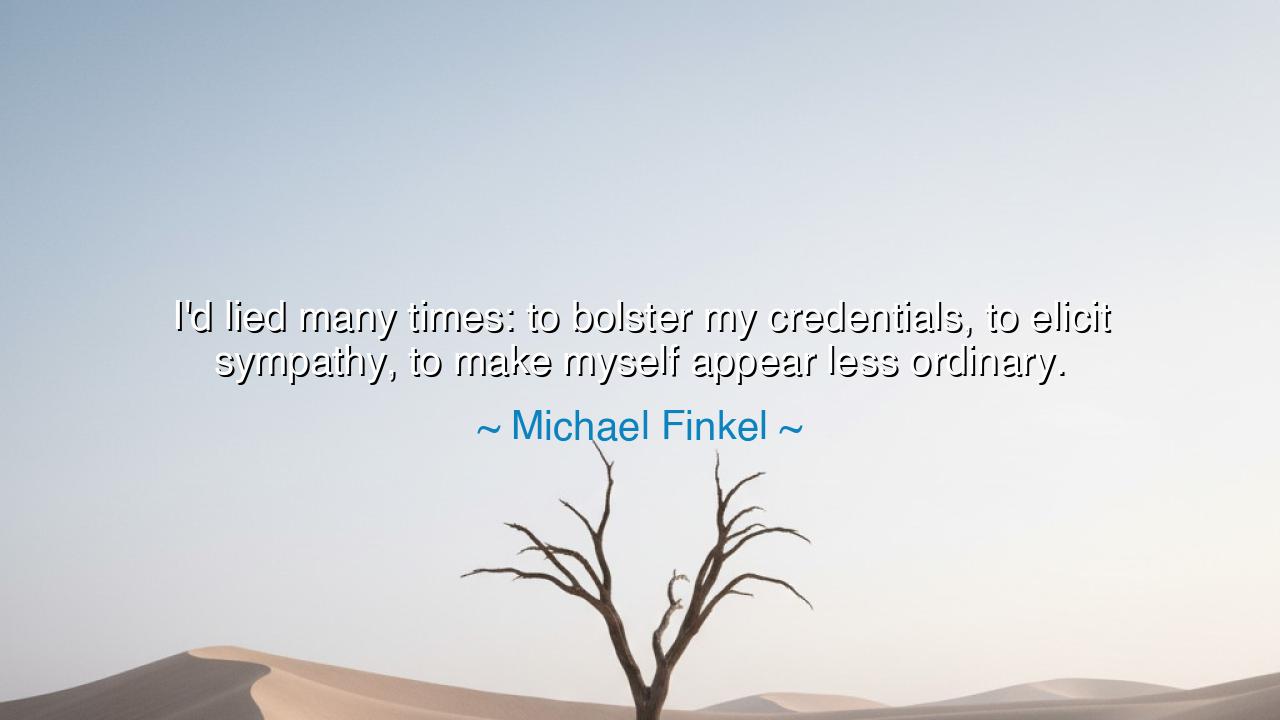
I'd lied many times: to bolster my credentials, to elicit
I'd lied many times: to bolster my credentials, to elicit sympathy, to make myself appear less ordinary.






In the grand theater of life, there are few roles as intricate and weighty as that of the self-deceiver. It is within the depths of deception that one finds the paradox of human existence: a constant struggle between authenticity and the desire for recognition. Michael Finkel’s reflection, "I'd lied many times: to bolster my credentials, to elicit sympathy, to make myself appear less ordinary," is a profound acknowledgment of the forces that drive one to fabricate, not out of malice, but out of a deep and human desire for acceptance and validation. In these words, we hear the echo of those who, throughout history, have donned falsehoods like a cloak, not to deceive others but to soothe their own restless hearts.
The practice of lying, particularly to bolster one’s credentials, is not a new phenomenon. From the earliest days of civilization, individuals have been driven to elevate their status, to climb the social ladder by any means necessary. Ancient rulers, like the Pharaohs of Egypt, are known to have inflated their achievements, presenting themselves as divine figures who wielded the power of the gods. They created monumental lies not out of a desire to harm others, but to construct a legacy that would withstand the sands of time. In such cases, lies were woven into the very fabric of their reign, bolstering their authority and reinforcing their immortality in the eyes of their people.
But Finkel’s quote is not solely about the grandiose lies of emperors; it speaks to the quieter, more personal fabrications that many weave in their everyday lives. The desire to elicit sympathy, to be seen as vulnerable or special, is a force as ancient as the human condition. The Greek philosopher Socrates once said, “The unexamined life is not worth living.” Yet, how often do we examine our lives through the lens of others’ perceptions, shaping the truth to present ourselves as more than ordinary? This is a universal struggle, the human tendency to paint over the mundane with strokes of grandeur, not necessarily for personal gain but for the satisfaction of being seen.
Consider the tale of Catherine the Great, who rose from humble beginnings as a minor princess of a small German principality to become the Empress of Russia. To secure her position and her power, Catherine engaged in calculated deceptions, presenting herself as the ideal ruler—capable, wise, and divinely chosen. Her entire reign was marked by this duality: the truth of her origins, juxtaposed with the myth she crafted. She was not alone in this, for many who rose to power, from kings to politicians, often embellished their stories, creating a narrative more flattering than their humble realities.
Yet, the cost of such deception, Finkel suggests, is not without its toll. To make oneself appear less ordinary is an act that risks losing touch with one's true self. In striving to be more than what one is, we often find ourselves entangled in a web of falsehoods that alienate us from the people who matter most—those who would love us not for our credentials or achievements, but for the truth of our being. The historian Plato cautioned, “The greatest deception men suffer is from their own opinions.” In other words, we lie to ourselves just as much as we lie to others, creating a world of illusions in which our true selves are buried beneath layers of falsity.
The lesson here is clear: authenticity is not a luxury but a necessity. The path to true greatness is not paved with lies, no matter how noble the intent. It is only when we cast aside the need for validation and embrace the truth of our imperfections that we can begin to live fully and freely. As the Roman philosopher Seneca taught, “It is not that we have a short time to live, but that we waste a lot of it.” Time spent in deceit is time spent in chains, whereas truth sets the soul free.
Therefore, let us be mindful of the temptation to lie for the sake of recognition. Let us instead build our lives not upon the fleeting pillars of falsehoods, but upon the enduring foundation of truth. It is in the simplicity of our genuine selves that we find the strength to overcome the ordinary and achieve the extraordinary. We must not fear the truth, for it is in our authenticity that our true power lies.






AAdministratorAdministrator
Welcome, honored guests. Please leave a comment, we will respond soon